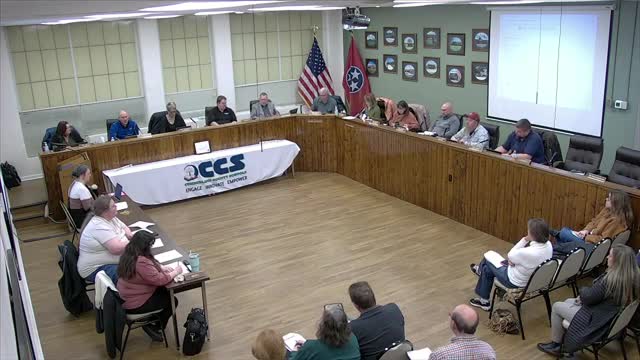Cumberland County school board votes 5-4 to reject director of schools contract
Get AI-powered insights, summaries, and transcripts
Subscribe
Summary
After more than an hour of public comment and board debate, the Cumberland County Board of Education voted 5-4 to decline approval of Director of Schools William Stepp’s proposed contract.
The Cumberland County Board of Education voted 5-4 on Jan. 27 to not approve the proposed contract for Director of Schools William Stepp.
The vote followed a lengthy public-comment period during which multiple residents urged the board either to retain Stepp or to reject the proposed contract. Supporters cited recent gains and community engagement; critics pointed to staff complaints and concerns about operational follow-through.
The vote matters because it determines whether the board will move forward with the compensation and term changes in the proposed contract for the district’s top administrator. The decision leaves the district without board approval of the new contract language at this meeting and sets the issue for further action by the board.
Public commenters who urged retention described improvements they attribute to Stepp. Blair Woodcock said, “He makes it a point to ride buses with students, eat lunch with the kids in cafeterias, [and] visit as many teachers and classrooms as he can throughout our county.” Several other speakers echoed that view, citing improved test scores and renewed community relationships.
Other speakers pressed the board to reject the contract on the grounds of concerns raised by school employees. In public comment, Steve Franson questioned performance measures and said, “How can you get a B when the state test scores show that 73 percent of our students are not proficient in math and 58% in reading.” Board member debate picked up those concerns: one board member said, “Our teachers feel that he’s inaccessible…The teachers feel that it’s more of a mall walk down than it is really getting into the classrooms.” That member told colleagues they were receiving similar complaints from teachers across multiple schools.
Board members who supported the contract framed the issue as a matter of stability and progress. One board member told colleagues, “If he fails, we fail. As his employer, it’s our job to give him the tools and the knowledge to be successful.” Another said the board was “micromanaging” and risked losing gains if leadership continuity was interrupted.
After discussion, the board took a roll-call vote on a motion “to not accept the contract.” The roll call recorded these votes: Cole — yes; Davis — yes; Hale — yes; Matthews — yes; Nichols — no; Stout — no; Stowell — yes; Van Winkle — yes; King — no. The motion passed, 5–4, meaning the board did not approve the proposed contract that was before them.
The board recessed for about 10 minutes after the vote and later continued with other agenda items. The meeting record does not show a subsequent board action to adopt an alternate contract or to finalize different terms for Stepp on Jan. 27. Next steps — whether the board will reopen negotiations, bring a revised contract back for a vote, or take other action — were not specified during the meeting.
The contract vote occurred amid broader community debate about district direction and management. Multiple speakers and several board members referenced staff morale, communication channels and whether complaints had been raised through principals and supervisors or only privately to board members. Several public speakers requested documented complaints be presented to the board if they existed; board members repeatedly cautioned against acting on hearsay alone.
The board’s decision does not itself terminate Stepp’s position; it declines to approve the contract before the board at that meeting. Any change in employment status or a different contract would require further formal board action at a future meeting.
